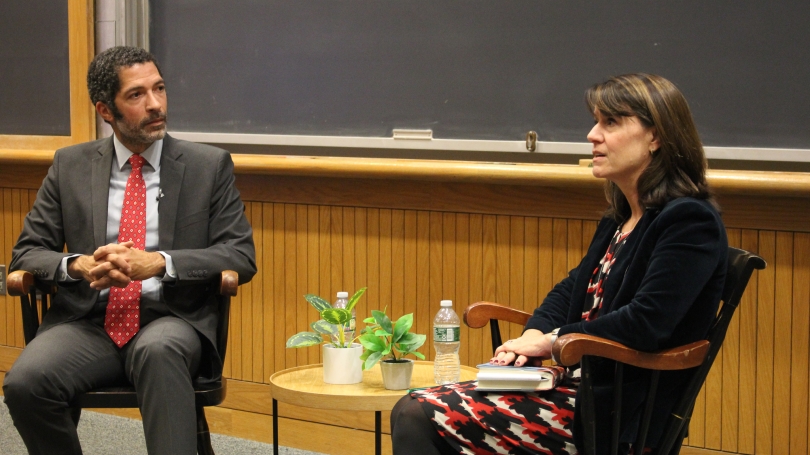
- Public Policy
- Leadership
- Funding
- News & Events
- About the Center
Back to Top Nav
Back to Top Nav
Back to Top Nav
Back to Top Nav
On Thursday, November 9, 2023, The Rockefeller Center hosted Associate Dean Matt Delmont, who discussed his recent book "Half American: The Heroic Story of Black Veterans Fighting World War II at Home and Abroad" in honor of Veterans Day. Delmont's talk was moderated by History Professor Leslie Butler.
Addressing a large audience in Rocky 003, Delmont began his talk by asserting that one, "cannot talk about American history without talking about the history of veterans." More specifically, he said he would be discussing the "inspiring and troubling history" of Black veterans.
Contextualizing his talk, Delmont said, "America and the Allies could not have won World War II without the contributions of black troops." He explained that 2,000 Black soldiers fought at Omaha Beach on D-Day and tens of thousands of Black soldiers, part of the Red Ball Express, moved 4,000 tons of ammunition after D-Day. Thanks to their work, America was able to sustain wartime assaults in France and Germany. Crucial to the American success was supply chains that provided troops with support throughout the war, according to Delmont.
Delmont went on to explain that "the war for Black Americans did not end in 1945." After World War II, Black veterans came back to rhetoric such as that of James. O Eastland, a Democratic Senator from Mississippi who said, "Negro soldiers have disgraced the flag of their country" on the floor of the Senate in June of 1945. Delmont characterized Black Americans' fight as moving from the "European theater to the Southern theater."
Discussing the GI Bill, Delmont noted that while the legislation helped white veterans to enter the middle class, there was a lot of discrimination against Black Americans who tried to access its benefits. According to Delmont, 98% of home loans through the GI bill went to White Americans and there was a de facto difference of $100,000 between white and Black benefits based on a Brandeis study.
Delmont then discussed a chapter in Half American on what homecoming was like for Black veterans. He shared the story of four veterans who were victims of racially motivated murders after fighting for America in World War II. John C. Jones was lynched for allegedly trying to sneak into a white backyard; Maceo Snipes was killed by the Ku Klux Klan after being the first Black man to vote in a primary; Eugene Bell was abducted and killed by white men because he did not become a sharecropper; George Dorsey was shot 60 times at close range by his landowner because "he thought he was as good as white people after the war."
According to Delmont, "violence against Black veterans was about power." He shared a quote from an unnamed Black Army veteran who said, "in Italy and Germany, we knew which way they were coming from but not here."
Delmont also recognized the contributions of Black women in World War II. Thousands of Black women served in the Women's Army Corps, and Delmont noted that many went on to participate in the civil rights movement.
Delmont finished by telling the story of his interview with Robert P. Madison, a World War II veteran who is now 100 years old. "We were a forgotten group of people," Madison said in his interview. The legacy of Black veterans is not that long ago, Delmont emphasized.
"I wrote this book for veterans like Robert Madison who never stopped fighting for America," Delmont concluded.
In the moderated Q&A with Butler, Delmont discussed his research process which relied heavily on the Black press.
By Varun Swaminathan '26, Rockefeller Center Student Assistant for Public Programs